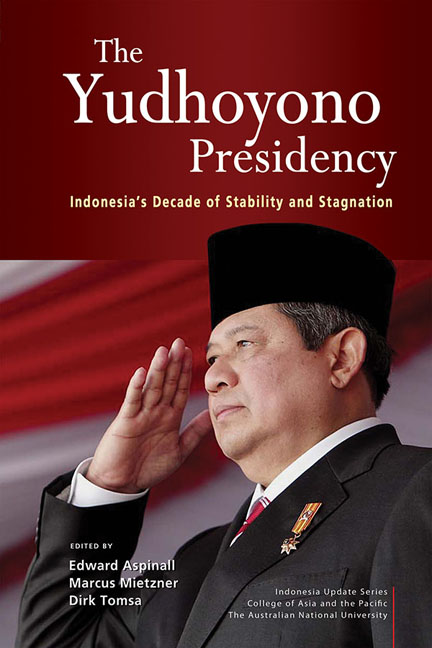Book contents
- Frontmatter
- Contents
- Tables and figures
- Contributors
- Acknowledgments
- Glossary
- 1 The moderating president: Yudhoyono's decade in power
- 2 Prologue Yudhoyono's legacy: an insider's view
- PART 1 PERSONAL, COMPARATIVE AND INTERNATIONAL PERSPECTIVES
- PART 2 INSTITUTIONS, POLITICS AND SECURITY
- 6 A balancing act: relations between state institutions under Yudhyono
- 7 Professionalism without reform: the security sector under Yudhoyono
- 8 Yudhoyono's legacy on internal security: achievements and missed opportunities
- 9 Toning down the ‘big bang’: the politics of decentralisation during the Yudhoyono years
- 10 The rule of law and anti-corruption reforms under Yudhoyono: the rise of the KPK and the Constitutional Court
- PART 3 GENDER, HUMAN RIGHTS AND ENVIRONMENT
- PART 4 THE ECONOMY AND SOCIAL POLICIES
- Index
- Miscellaneous Endmatter
7 - Professionalism without reform: the security sector under Yudhoyono
from PART 2 INSTITUTIONS, POLITICS AND SECURITY
Published online by Cambridge University Press: 19 May 2017
- Frontmatter
- Contents
- Tables and figures
- Contributors
- Acknowledgments
- Glossary
- 1 The moderating president: Yudhoyono's decade in power
- 2 Prologue Yudhoyono's legacy: an insider's view
- PART 1 PERSONAL, COMPARATIVE AND INTERNATIONAL PERSPECTIVES
- PART 2 INSTITUTIONS, POLITICS AND SECURITY
- 6 A balancing act: relations between state institutions under Yudhyono
- 7 Professionalism without reform: the security sector under Yudhoyono
- 8 Yudhoyono's legacy on internal security: achievements and missed opportunities
- 9 Toning down the ‘big bang’: the politics of decentralisation during the Yudhoyono years
- 10 The rule of law and anti-corruption reforms under Yudhoyono: the rise of the KPK and the Constitutional Court
- PART 3 GENDER, HUMAN RIGHTS AND ENVIRONMENT
- PART 4 THE ECONOMY AND SOCIAL POLICIES
- Index
- Miscellaneous Endmatter
Summary
In October 2014, the Indonesian National Army (Tentara Nasional Indonesia, TNI) held the biggest military parade in the nation's history, complete with F16s whistling overhead, battleships and hundreds of military vehicles. This display of force was a farewell to Susilo Bambang Yudhoyono, who left behind a legacy of military modernisation and an emphasis on professionalism (Faridz 2014). From the podium Yudhoyono declared:
We have witnessed together advancements that make us proud: our defence posture is increasingly strong, our heavy weaponry is increasingly comprehensive and modern, the capacity and professionalism of the TNI is increasingly heightened, and we have finished and completed the reform of the TNI. We are thankful for the last ten years, and we have developed strength and modernisation well (Rizki 2014).
A few months earlier, on 1 July 2014, the anniversary of the founding of the Indonesian National Police (Polisi Republik Indonesia, Polri), the president spoke of his hopes to transform Indonesia's police into a ‘world-class’ force. Modernisation of equipment and technology was crucial to developing that professionalism. Apart from terrorism, he said, ‘your job is to bust criminals. Protect the community. That's it’ (Firdaus 2014). Professionalism through modernisation was the cornerstone of Yudhoyono's ten-year governance of the security sector.
Military professionalism was a longstanding theme in the president's intellectual history. But what did he mean by it? In 1990, on the precipice of the New Order's long decline, Yudhoyono presented a paper on military professionalism to the Army Staff and Command College (Sekolah Staf dan Komando Angkatan Darat, Seskoad) (Yudhoyono 1990). In it he rejected the liberal preoccupation with civilian supremacy over the military as a Western import. He argued that officers of the Indonesian Armed Forces (Angkatan Bersenjata Republik Indonesia, ABRI) should be professional, not liberal-democratic, and that ABRI's professionalism did not limit the force to one neat category, ‘soldier’, ‘nation-builder’, ‘leader’ or ‘state functionary’. ABRI was all these things and as long as it adhered to professionalism, morality, security expertise, solidarity, leadership, unity and closeness to the people, then it would remain the only institution able to deliver security and stability amidst development. Honna (2003: 77–9) described Yudhoyono's idea of professionalism as a catch-all concept directed against the threat of social change.
- Type
- Chapter
- Information
- The Yudhoyono PresidencyIndonesia's Decade of Stability and Stagnation, pp. 114 - 135Publisher: ISEAS–Yusof Ishak InstitutePrint publication year: 2015



